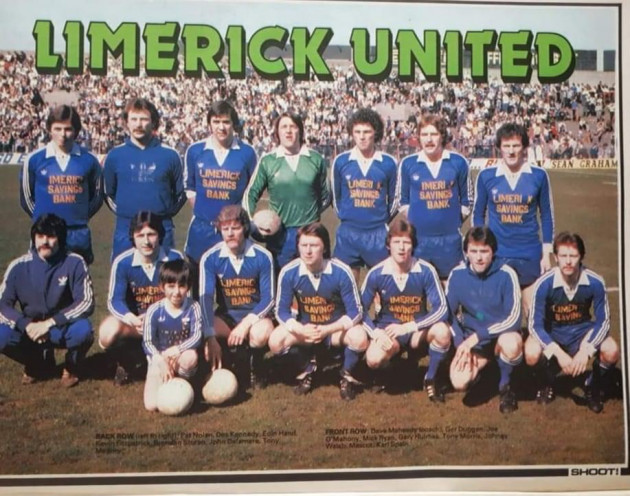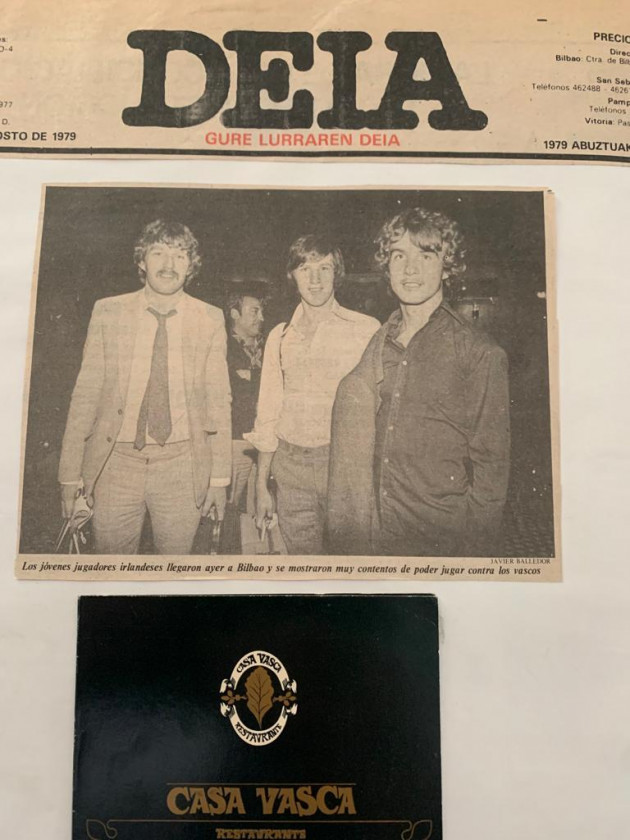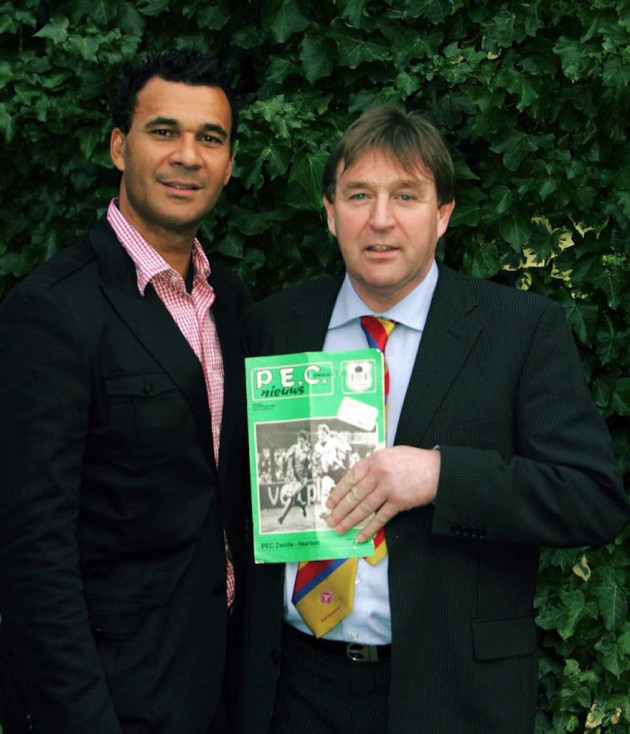THE LATE GEORGE Murray ran record stores across Dublin, but when his neighbour John Delamere was a teenager, all he wanted to hear was Murray’s phone ring.
Delamere’s house didn’t have a phone but Murray’s did, meaning when Shelbourne’s B team were short of players, a call would be put into Murray’s to tell John to grab his gear and hop on his bike to Harold’s Cross.
Delamere went on to win a league title with Limerick United, top the league’s scoring charts with Shelbourne, and enjoyed a brief but dazzling stint in the Dutch Eredivisie. He did it all while enduring the grinding parsimony of professional football in the 1970s and 80s; working in a zero-sum game when the sums were pitifully low.
Football entered Delamere’s family. His step-brother, Paddy Turner, played seven times for Celtic and twice for Ireland, winning a league title with Shamrock Rovers and Dundalk.
Delamere also played with St Pat’s B team, with whom he suffered a horror leg break in 1974, when he was only 17. He winches up the hem of his trousers to show me a crescent-shaped scar almost as deep as a cigarette dish.
“The leg break slowed my whole career down”, he says. “I have no doubt I’d have played in Pat’s first team at 17, only for the break.”
Pat’s manager at the time was Jack Burkett, who won the FA Cup and Cup Winners’ Cup for West Ham, playing alongside Bobby Moore. “He was a real Londoner”, says Delamere. “Dressed so well, really elegant, tall, tanned. I always remember, he came to my house in Drimnagh to see if I was alright. Caring: some of that doesn’t even go on today.”
Pat’s made it to the FAI Cup final that same year, losing 3-1 to Finn Harps. Delamere watched on from the stands on crutches. He recovered and made his first-team league debut for Shelbourne against Shamrock Rovers in 1976, though it came after some character-building on the bench.
“I started as a sub, trying to get in the team. We went down to play Sligo, and Paul McGee was playing for Sligo. I was in the dugout. I always remember him getting the ball, back-heeled it through one of our fellas’ legs and whoosh, he was gone. I was thinking, ‘fucking hell’, the level I’m coming into here. He was an exceptional player. But at the time he was playing League of Ireland, and you don’t realise he was going on to play 16 times for Ireland. Trying to break into the team and seeing that: it wobbles you a bit.”
But Delamere did break into the team, playing with one of Celtic’s Lisbon Lions, Jimmy Johnstone, during his brief spell in Dublin. Johnstone played nine times for Shels in what proved to be the penultimate season of his career.
“I got on great with him”, says Delamere of Johnstone. “He was a character. We just hit it off. Paddy, my stepbrother, played with him at Celtic. Jimmy had no money then, he was broke. It was so sad. Shels wouldn’t have had much money at the time but you’ll always find a few bob here and there. And Jimmy, at the end of the day, wouldn’t have wanted that much. His pace was gone at that point. Here, the pitches weren’t great, it was physical…it must have been hard for him.”
Still, Johnstone took to life off the pitch in Dublin, and Delamere helped him explore the city beyond the four walls of his room in the Royal Hotel on O’Connell Street.
“There used to be a jukebox upstairs in Madigan’s on Moore Street, and we’d have a few beers”, remembers Delamere. “He loved a singsong, Mull of Kintyre would come on, he’d get up on a stool and start singing. I knew he was a great player, but when you look back now and realise all he won and all he achieved, I would have been in awe of him had I known it then.”
Johnstone moved on and Delamere did too, joining Sligo Rovers, for whom he played in the 1978 FAI Cup final against the Shamrock Rovers of John Giles, Eamon Dunphy, and Ray Treacy.
Delamere still bridles at the game’s decisive moment: the awarding of a penalty to Shamrock Rovers by referee John Carpenter, when Steve Lynex went over in the box under pressure from Paul Fielding. Sligo seethed, but Treacy converted the penalty for what was the game’s only goal.
Delamere returned to Shelbourne, for whom he was top scorer in the 78/79 season, with 17 goals. He combined football with shift work at Cherry Orchard hospital, and moved to Limerick United during the following season, living with player-manager Eoin Hand and with a promise from the club of full-time pay.
The season ended with a league title triumph but a message to Delamere that they couldn’t afford to pay him after the final game.
“They told me it was full-time, I was too proud to come back home”, says Delamere. “This was my big move to Limerick, my chance to do well after having no money with Shelbourne, no money at Pat’s. But instead I used to go into bars to be given toasted sandwiches. Mickey Webb was the chairman, I might get a few bob off him to keep me going. I was too proud to come back to Dublin, and I wouldn’t sign on the dole. When you’re in Limerick, you’re well known. It’s like in Sligo: with provincial papers, you’re well known. I wasn’t going to stand in a dole queue in Limerick. I don’t want to be looking back in anger, but it’s the truth.”
Delamere ultimately went on loan to Cork United, and later that year, he was back in Dublin training with Hammond Lane when Limerick learned their fate in the European Cup.
“I came in from training”, says Delamere. “Adrenaline was pumping, I was covered in muck, and I was told there was a phonecall for me in the hallway.
“It was Eoin on the phone. He said, ‘We’re after drawing Real Madrid. Will you come down to training?’
“I was wrong in what I said, but looking back at the context now, I can understand why I said it. I said, ‘You can shove your Real Madrid up your ass Eoin.’”
Limerick ultimately lost 2-1 to Madrid at Lansdowne Road, a game into which Delamere paid. He says he has since buried the hatchet with Eoin Hand and moved on.
Delamere didn’t make the trip to Madrid with Limerick but he did earn one trip to Spain.
In 1979, John Giles was player-manager with Ireland, and approached Delamere about a couple of colliding friendly matches. Giles was putting together a League of Ireland XI to play a friendly game against Liverpool, and approached Delamere to say he would be in with a chance of featuring, but would be more likely to play a game in Spain with a team organised by then-Bohemians manager Billy Young.
Delamere picked the trip to Spain, for what proved to be a historic occasion. Their opponents were the Basque Country, in what was their first international match since 1937, following the fall of General Franco.
“Before the game at training, my lace broke”, remembers Delamere. “I was nervous as hell and now I had no laces, so we went trying to find laces. There was a bomb scare ahead of the match but I didn’t know anything about it: I was more concerned about my laces! We were told we were big heroes; brave and this and that to come over and play at the time. The ETA was still strong, it was like the North at the time: bombs were going off, but we didn’t know about it at the time.” The Basques – featuring the father of future Spanish World Cup winner Xabi Alonso – ran out 4-1 winners in front of an estimated 40,000 people.
Delamere also featured for the Irish Amateur side in 1979, scoring home and away against the Netherlands, achievements that left a mark. Watching on that day was a Dutch footballer, Gerrit Borghuis, who had played in the North American Soccer League with Irish football legend Eric Barber, who happened to live next door to Delamere in Drimnagh. By 1981, Borghuis was involved with Eredivisie side PEC Zwolle and he wanted to sign Delamere, who was at this stage back at Shels. Borghuis tried ringing the Shelbourne Hotel to track down Delamere – no dice – but eventually got in touch via Barber.
Delamere went over, scored four times in a trial game and then got a contract, joining during the 81/82 season and living out of a hotel.
He didn’t take long to get to grips with the place, and scored three league goals to help them avoid relegation. He also scored twice in a Cup win over a Groningen side featuring current Dutch national team manager Ronald Koeman, an achievement made more impressive by the fact he was still bearing the raw damage of a car crash on the way to the ground. Delamere was the passenger, but thumped his head against the windscreen when the Volvo he was in hit a car in front of it. He was stitched up and brought to the game by police.
That era of Dutch football afforded Delamere a brush with many of the nation’s greats: he played against a young Ruud Gullit, then of Haarlem, while his sole meeting with Johan Cruyff came in a friendly match, missing the subsequent league meeting with Ajax as he flew home to be with his mother, who had fallen ill.
Zwolle, however, were a financial mess, and only the benevolence of a local businessmen and a structural organisation saved them from bankruptcy in the year after Delamere joined, and the club finally did hit the wall in 1990. Delamere left the club at the end of the 81/82 season, his exit hastened by a falling out with coach Fritz Korbach. He spent time with Thurles Town before another return to Shelbourne, which in turn led to an ill-fated return to the Netherlands, with SVV.
He left the club shortly after, spent time with Thurles town before another return to Shelbourne, which in turn led to an ill-fated return to the Netherlands, with SVV. He cut it short to start a delivery and transport business that’s still operating today. Delamere wound down his football career with Home Farm, finishing at the age of 31.
“At that point I needed to make a living”, says Delamere. “I had too much of hustling for a living. It was horrendous.
“You must remember: Giles, Dunphy, Hand, Eric, me: everyone was broke. Fucking broke. I bought Dunphy drinks on fucking Leeson Street when he had no money, before he got the RTE thing going. Everyone was fighting their own corner to survive. Like me.
“When I stopped playing, I hit the gargle. I did. I wouldn’t say I was depressed, but looking back at your career, you realise you’re so unlucky. You realise your life goes by you so quickly, and you want to be so much better.
“Every so often I would get down and go on the drink, as it was my way of dealing with what went on in my career. I hardly drink anymore, and I never drink at home. I was never a home drinker, I am a very sociable person. I was always a very good worker, and made a good few bob. Drink always impedes you in your life. I was driven, as my father worked. I left school early and I always wanted to be like my peer group and work. When that wasn’t there, I found that very difficult.
“Then you’d sit down and think, ‘What happened here and what happened there’, and the people who did the dirt on you. It’s hard to contemplate that sometimes.”
Delamere stuck around Shels, however, and ended up on the club’s board during Ollie Byrne’s tenure.
“I love Shelbourne”, says Delamere. “I will always have great feelings for it.”
Delamere requested this interview, as he wants his career recorded, primarily for the benefit of his 11-year-old son, and what emerges towards the end is a pride in what he did achieve and, despite it all, a vestigial love of the game. He is a presence on the sidelines now, and coaches a girl’s team at DCU with Mick Cooke.
Delamere nods in agreement when I quote Gareth Southgate about loving the game but not its industry.
“I love the game”, he says. “But I find it difficult to relate to, the way the money has gone. People on a couple of hundred grand a week: the game is gone. It has irrevocably changed. But I love the game. With DCU, I love going to see a normal little game with a lot of commitment.”




